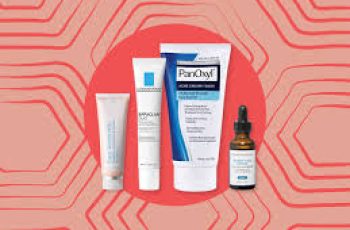Skincare Myth: Flax Seed is Natural Botox
Is Flax Seed Natural Botox?
Lately, there’s been a lot of buzz on social media about using flax seed masks as a “natural alternative” to Botox injections. As someone who values evidence-based skincare advice, I was a bit skeptical of these claims. Just because something is trending on Instagram or TikTok doesn’t automatically make it right for your unique skin type and concerns. Before jumping on the flax seed mask bandwagon, let’s take a closer look at the science behind Botox and flax seed oil to determine if they are truly comparable treatments.
Before we get started, take the Baumann Skin Type Quiz for free to take control of your skin health today!
What is botox?
Botox is the brand name for a neurotoxin called botulinum toxin type A. When injected into specific facial muscles, it temporarily paralyzes them and prevents them from contracting. This relaxation of the muscles smooths out existing wrinkles and prevents new ones from forming.
But how exactly does Botox achieve this effect? It all comes down to a protein called SNAP-25 that is involved in the release of acetylcholine, a neurotransmitter responsible for making muscles contract. Botox blocks SNAP-25, which in turn blocks acetylcholine release and causes the injected muscles to become temporarily paralyzed and unable to scrunch up the skin into wrinkles.
This mechanism makes Botox extremely effective at treating “dynamic wrinkles” caused by repeated muscle movements like frowning, squinting or raising the eyebrows. The injections directly target and relax the muscles underlying wrinkles in areas like the forehead, between the brows, and around the eyes for a smoother, more youthful appearance.
The effects of Botox typically last 3-6 months, after which touch-up treatments are needed to maintain the results. While safe when administered properly, Botox does carry a small risk of potential side effects like bruising, headaches, or temporary muscle weakness in the treated areas.
What is Flax Seed Oil?
Now let’s look at how flax seed oil and masks made from it actually work on the skin. Flax seeds are a good source of beneficial nutrients like:
Omega-3 fatty acids like alpha-linolenic acid (ALA)
Other fatty acids like linoleic acid and oleic acid
Antioxidants like lignans and vitamin E
When applied topically as part of a face mask or moisturizer, flax seed oil provides some notable benefits to skin health:
Hydration from fatty acids that help attract and retain moisture
Anti-inflammatory effects thanks to the omega-3s
Antioxidant protection against sun damage
Potential improvements in skin firmness and elasticity
However, none of flax seed oil’s mechanisms of action directly target the facial muscles and SNAP-25 protein the way Botox does. Its benefits are limited to the outer layers of skin, providing nourishment, hydration, and protection. It is important to understand that I am not saying flax seed oil is a bad ingredient; on the contrary, I think it can be beneficial for many skin types to include in their daily regimen. You can find my complete thoughts on flax seed oil in this blog. The purpose of this blog is simply to dispel the myth that flax seed is natural Botox. It simply is not natural botox. If flax seed oil is right for your skin type, I recommend some of these products:
Key Differences Between Botox and Flax Seed
While both aim to improve skin’s appearance, Botox and flaxseed masks work in fundamentally different ways:
Botox relaxes facial muscles from the inside out to smooth wrinkles, while flax seed oil only acts on the outer skin layers, and doesn’t impact muscles.
Botox prevents dynamic wrinkles from forming in the first place, something flax seed masks cannot do.
Botox reduces existing wrinkles more dramatically and immediately through muscle paralysis. Flax seed masks may eliminate some free radicals on the skin over time, but not to the same effect.
The effects of Botox are temporary so require ongoing treatments to maintain. Flax seed can be included in one of your daily skin care products.
Botox carries some minor safety risks from injections that flax seed masks applied topically do not have.
Conclusion – Flax seed is not Natural Botox
While flax seed masks can impart some respectable skin benefits from their nutritional makeup, the simple fact is flax does not work on the same biological mechanisms that make Botox so effective for dynamic wrinkles.
Claims that flax seed masks are a true “natural alternative” to Botox are misleading. The two have fundamentally different mechanisms of action and cannot be considered substitutes or equally effective treatments.
This isn’t to say flax seed products are bad – they still provide benefits like hydration, anti-inflammatory effects, and potential improvements in elasticity over time with regular use. But they work on the surface of skin, not the underlying muscles that crunch it into wrinkles.
When it comes to social media skincare advice, it’s important to take viral trends with a grain of salt. Something that seems to work wonders for one person’s Baumann skin type might not produce the same results for you. Always do your research from reputable science-based sources to make informed choices about what’s right for your individual skin.
To get the best recommendations for your skin care routine, take our quiz today!
DQH Can I use salicylic acid first and then vitamin C?
It’s easy to create a skincare routine, but knowing how to use it is another thing entirely. In most cases, if you’re not getting the desired skin results, it could be due to the layering of conflicting ingredients. So, is it possible that salicylic acid and vitamin C are such ingredients? Or are these active ingredients the duo that’s been missing from your skincare routine? If you want answers, stick around because today we are going to explain the benefits of salicylic acid and vitamin C and how they can be used in your daily life.
What are the benefits of salicylic acid for skin?
Salicylic acid is one of the most commonly used beta hydroxy acids and is favored by many people with oily, acne-prone skin. This acid is derived from willow bark, and unlike its water-soluble relatives (called alpha-hydroxy acids), salicylic acid is oil-soluble, which means it can penetrate deeper into the lower layers of the skin. Once it reaches the lower layers, it can help unclog pores of excess sebum, dirt, bacteria, debris, and impurities. This results in clearer skin tones and greater definition.
Not only does salicylic acid benefit the underlying layers, but the outer surface of the skin benefits as well. When applied to the skin, salicylic acid removes the buildup of dead skin cells. This is accomplished by breaking the bonds that hold dead cells to the surface. Over time, this can cause the complexion to look dull and prone to acne, blackheads, and other blemishes.
If you’d like to learn more about salicylic acid and how it can improve your skin, check out this dedicated blog post from a beauty insider.
What are the benefits of vitamin C for skin?
Vitamin C is considered one of the most powerful antioxidants, which means it is very effective at fighting free radicals and preventing them from causing further skin damage. Examples of free radicals include pollution, central heating, UV rays and harsh climate. They attack proteins, fats and cell membranes as soon as they come into contact with the skin, causing signs of premature aging such as fine lines and wrinkles as well as hyperpigmentation, flaky patches of skin and loss of elasticity.
Many people usually prefer to use vitamin C in their morning routine as this ingredient gives the complexion a radiant glow. You’ll also find that vitamin C can target areas of hyperpigmentation, plumping the skin and reducing the appearance of fine lines and wrinkles.
The thing about vitamin C is that there are a lot of outdated studies going back to the 1950s that describe vitamin C as an unstable skin component. Thanks to improvements in modern technology, this is no longer the case as all products now contain a stable form of vitamin C.
Visit The Beauty Insider to learn more about vitamin C. So please check out our blog post.
Can I use salicylic acid first and then vitamin C?
Yes, you absolutely can. In fact, it’s thought that using salicylic acid before using vitamin C ensures it penetrates faster and works faster.
This is an efficient way to utilize two power sources, and the reason has to do with pH. For example, the skin’s natural pH is about 4.7, making it slightly acidic. Salicylic acid and vitamin C are also both acidic, and you’ll find that vitamin C is absorbed quickly into the skin. Therefore, using salicylic acid beforehand can increase the acidity of the skin and allow vitamin C to penetrate into the skin faster.
While this is considered an effective way to combine two powerful ingredients, you need to be aware of your skin type and how it reacts to certain active ingredients. Even people with perfect, normal skin can experience skin sensitivity and irritation. Therefore, always consult a doctor or dermatologist before using any new products on your skin.
It’s also important to follow skin application rules. In this case, you need to use the product correctly to ensure you get the best results for your skin. If you’re not sure what I mean, the basic rule for skin is to start with the thinnest consistency and work your way up to the thickest consistency. This prevents a barrier from forming on the surface, preventing other active ingredients from penetrating the skin.
Can I use salicylic acid at night and vitamin C in the morning?
Yes, absolutely, this is considered the most effective way to get returns without any adverse side effects. This is because there is enough time between applications to ensure that the skin’s pH levels return to balance.
You’ll also find that Vitamin C is rich in antioxidants and is perfect for use in the morning to ensure your skin is protected and looking its healthiest. Due to the small size of salicylic acid molecules, it is an acid that is able to reach the deepest parts of the skin. While this is effective at keeping skin clear, it also increases the risk of irritation and photosensitivity. Therefore, many people prefer to use powerful BHAs in their evening routine without exposure to UV rays, pollution, or harsh weather.
Warning: If you avoid using sunscreen every day, none of these ingredients will do what your skin needs. The combination of chemical peels and powerful ingredients increases the risk of further damage to the skin’s surface. Use SPF 50 every day to keep your skin protected and your lipid barrier healthy, even on cloudy days, keeping your skin in top condition.



